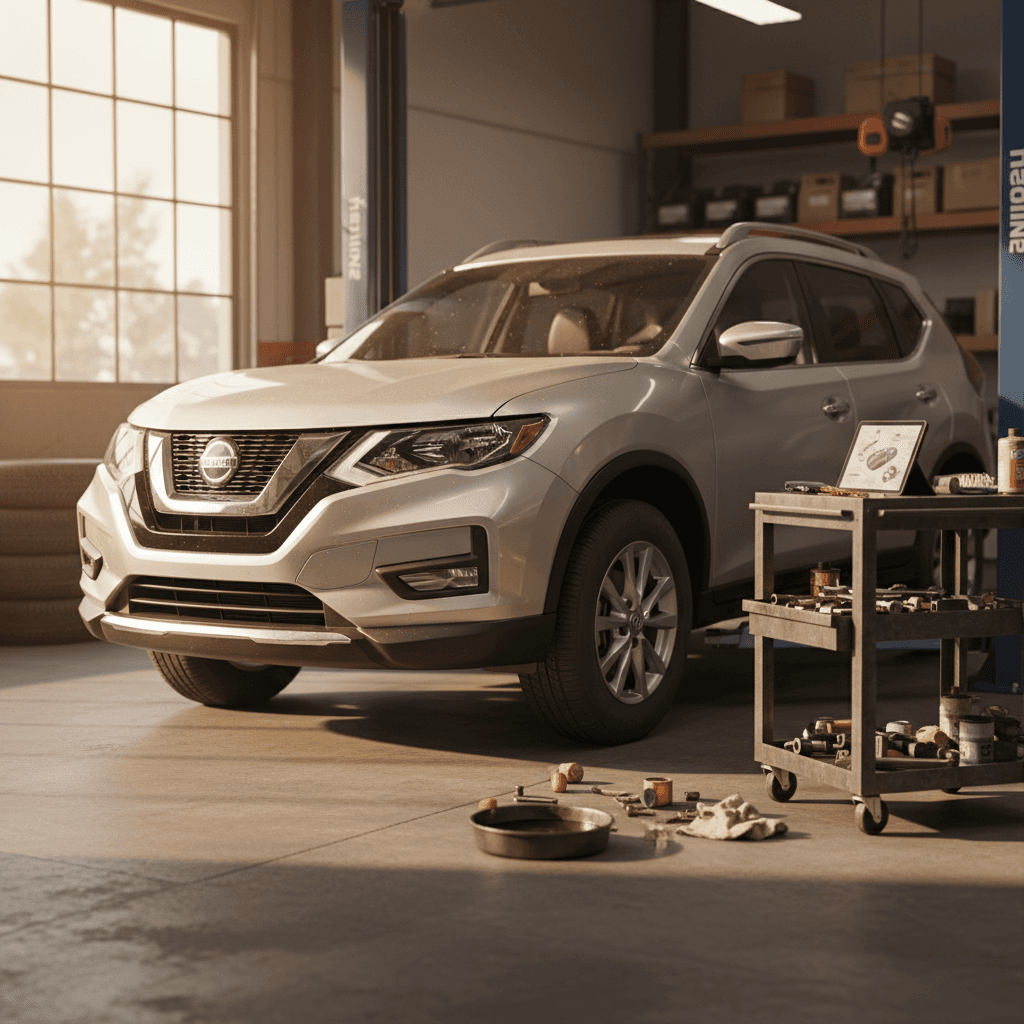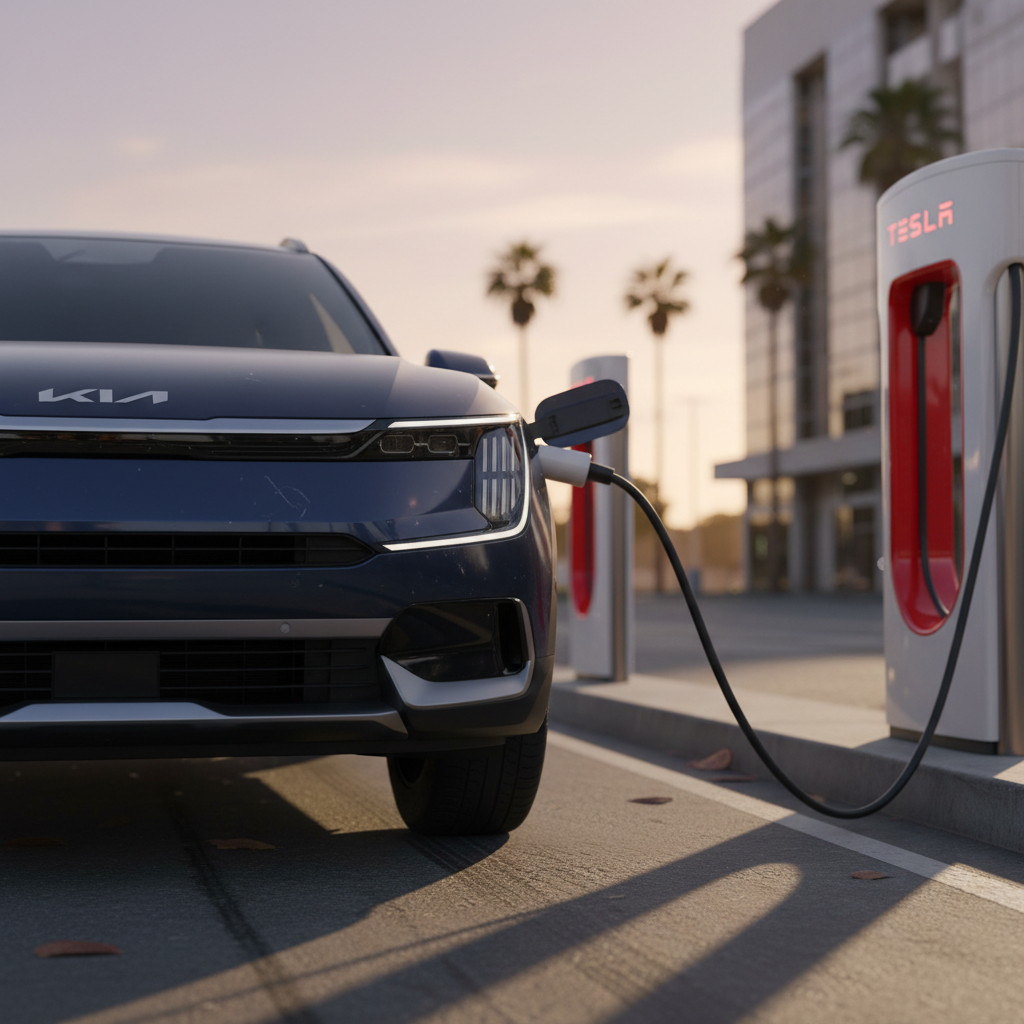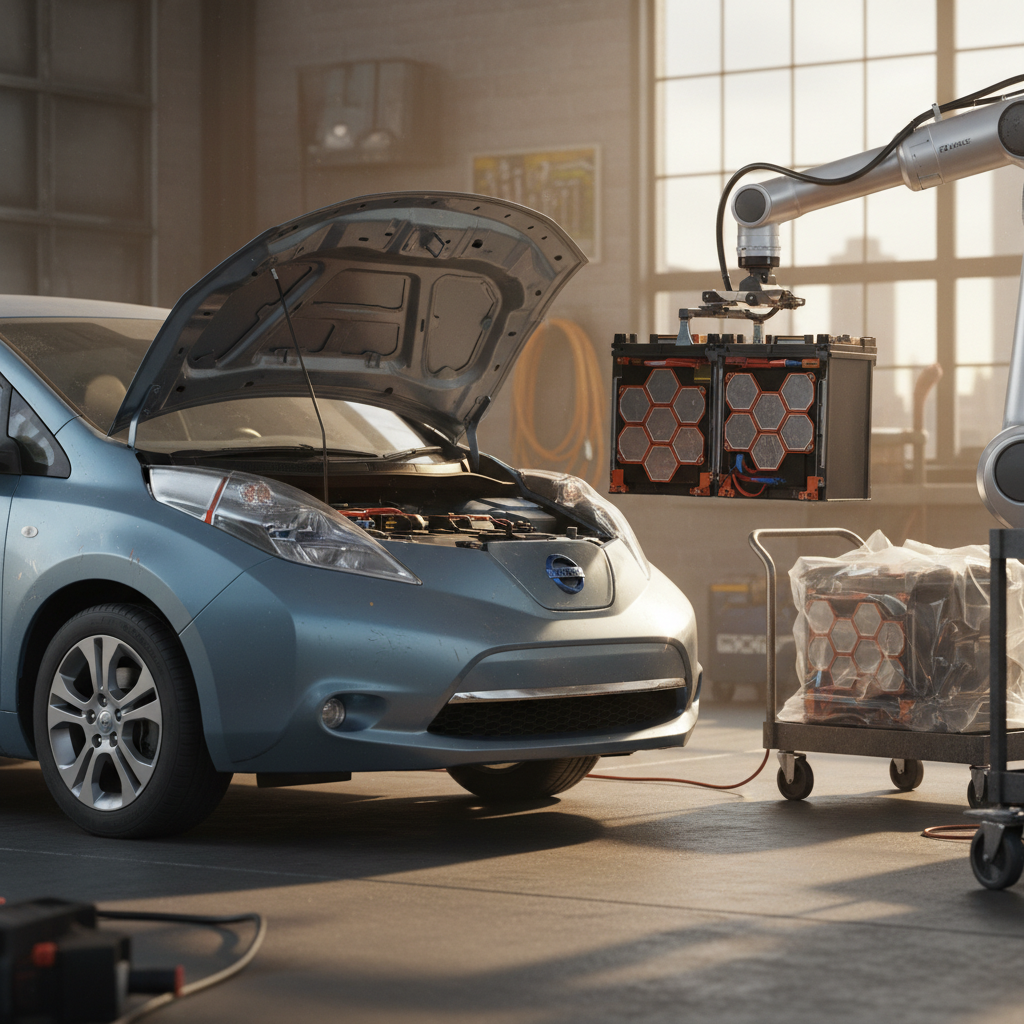If you own a 2018 Nissan Rogue, staying on top of the service schedule is one of the best ways to keep its CVT, brakes and engine happy well past 100,000 miles. Below is a practical look at the 2018 Nissan Rogue service schedule, based on Nissan-style maintenance intervals and real-world shop experience, so you know what to do, when to do it, and what’s worth paying for.
Always double-check your owner’s manual
2018 Nissan Rogue maintenance overview
For most 2018 Nissan Rogue models in the U.S., you can think of maintenance in 5,000‑mile building blocks. Every 5,000 miles or 6 months you’ll handle basic items like oil and tire rotation, and every 30,000–100,000 miles you’ll layer in bigger services like brake fluid, CVT fluid, spark plugs and coolant.
- Base interval: about every 5,000 miles or 6 months for oil, filter, and inspections
- Key milestones: 10k, 20k, 30k, 60k and 100k miles for the bigger services
- Two schedules: one for normal driving, one for severe driving (lots of short trips, heavy stop‑and‑go, delivery work, extreme temps)
Quick rule of thumb
2018 Nissan Rogue service schedule by mileage
Here’s a simplified 2018 Nissan Rogue service schedule you can keep on your phone or in the glove box. It’s meant for the 2.5‑liter gasoline Rogue sold in North America.
2018 Nissan Rogue maintenance schedule (normal use)
Approximate intervals for key maintenance items on a 2018 Rogue. Use mileage or time, whichever comes first.
| Mileage / Time | Core services | Additional inspections / replacements |
|---|---|---|
| Every 5,000 mi / 6 months | Change engine oil & filter; rotate tires; check and adjust tire pressure | Inspect brakes, belts, hoses, fluid levels, wipers, exterior lights |
| 10,000 mi / 12 months | Repeat 5k‑mile services | Inspect cabin air filter, CVT fluid, steering & suspension, axle boots |
| 20,000 mi / 24 months | Repeat 5k‑mile services | Replace cabin air filter; inspect fuel lines, EVAP lines; replace brake fluid (2–3 years is a good target) |
| 30,000 mi / ~3 years | Repeat 5k‑mile services | Replace engine air filter; inspect CVT fluid, drive belts, suspension, steering |
| 60,000 mi / ~5–6 years | Repeat 5k‑mile services | Consider CVT fluid drain & fill; inspect drive belt; replace brake fluid if not done recently |
| 75,000–90,000 mi | Repeat 5k‑mile services | Deeper inspection of suspension, wheel bearings, exhaust, steering components |
| 100,000–105,000 mi or 7–8 years | Repeat 5k‑mile services | Replace spark plugs; replace coolant; inspect/replace CVT fluid if not previously serviced |
Always follow whichever comes first: the mileage or the time interval.
Normal vs. severe schedule
Oil change and filter intervals
For a 2018 Nissan Rogue, most dealers and independent shops in the U.S. now recommend oil changes every 5,000 miles or 6 months, even if the manual lists a longer range for “normal” driving. That’s especially true if you’re using a full‑synthetic 0W‑20 oil, which is standard on late‑model Nissans.
2018 Rogue oil change basics

- Use full‑synthetic 0W‑20 that meets Nissan specifications.
- Always replace the oil filter with the oil, don’t skip it to save a few dollars.
- If you do a mix of highway and city, 5,000 miles is a safe, easy‑to‑remember number.
- For low‑mileage drivers (under 7,000 mi/year), focus on time: change oil every 6–12 months regardless of mileage.
DIY vs. shop oil changes
Tires, brakes, and suspension checks
Your 2018 Rogue is relatively light for a crossover, but it still leans on tires and brakes to manage the extra weight compared with a sedan. Nissan and most dealers recommend tire rotation every 5,000 miles, which pairs nicely with oil changes.
Key chassis items on your 2018 Rogue
What to check and how often
Tire rotation
Rotate tires every 5,000 miles to even out wear front to rear. This helps you get the most life from a set of tires and can reduce road noise.
Brake inspections
During every oil change, have the shop measure pad thickness and inspect rotors and brake hoses. Many Rogue owners see pads last 30,000–50,000 miles, depending on driving style.
Suspension & steering
By 60,000–80,000 miles, it’s worth a closer inspection of struts, shocks, ball joints and tie rods, especially if you hear clunks or feel vibration at highway speeds.
Don’t ignore brake warning signs
CVT transmission fluid service
The 2018 Nissan Rogue uses a CVT (continuously variable transmission). It’s more sensitive to heat and fluid condition than a traditional automatic, which is why many techs suggest regular fluid changes even if the manual is vague or optimistic.
Conservative CVT maintenance plan
- Inspect CVT fluid level and color at least every 20,000–30,000 miles.
- Perform a drain-and-fill CVT service around 60,000 miles, earlier if you drive in severe conditions.
- Use only Nissan NS-3 or fluid explicitly approved for Nissan CVTs.
Why it matters
- Fresh fluid helps the CVT run cooler and reduces wear on the belt and pulleys.
- Early maintenance is cheaper than a transmission replacement, which can run into the thousands of dollars.
- Frequent highway driving, mountain grades, or towing call for shorter intervals.

Drain-and-fill vs. flush
Engine air and cabin filter replacement
Your filters are cheap insurance against premature wear and fogged‑up, musty interiors. The 2018 Rogue has two main serviceable filters: the engine air filter and the cabin (in‑cabin) microfilter.
Filter intervals for a 2018 Rogue
Engine air filter: ~30,000 miles
Many schedules call for <strong>every 30,000 miles</strong>, or sooner in dusty climates. A clogged air filter can hurt fuel economy and throttle response.
Cabin air filter: 15,000–20,000 miles
A fresh cabin filter keeps the HVAC system breathing freely and removes dust and pollen. If you notice weak airflow or persistent odors, it may be overdue.
Quick visual checks between services
Most shops can pop the filters out during an oil change. Ask to <strong>see the old filter</strong> before approving a replacement so you’re not paying for unnecessary work.
DIY-friendly items
Spark plugs, coolant and other long-term items
Long‑life components don’t need frequent attention, but they’re easy to forget. On a 2018 Rogue that you plan to keep past 100,000 miles, spark plugs and coolant are the big ones to plan for.
Long-term 2018 Rogue maintenance items
Plan for these around 100,000 miles or 7–8 years
Spark plugs
The 2.5‑liter typically uses iridium plugs with a long service life. A common interval is around 100,000 miles. Misfires, rough idle or hard starts are signs they’re overdue.
Coolant / antifreeze
Factory blue coolant often goes 7 years or 100,000 miles before the first change. After that, many manuals call for shorter intervals, like every 60,000–75,000 miles.
Brake fluid
Even if mileage is low, brake fluid absorbs moisture over time. A 2–3 year interval is a smart safety move, especially in humid or coastal climates.
- Ask your shop to test coolant condition around 80,000–90,000 miles if the first change hasn’t been done.
- If you live where winters are harsh, proper coolant strength helps with freeze protection and heater performance.
- When spark plugs are replaced, it’s a good time to check ignition coils and clean the throttle body if needed.
Adjusting the schedule for severe driving
Nissan defines severe driving more broadly than most owners think. If your 2018 Rogue spends its life in city traffic, makes repeated short trips, or handles delivery or ride‑share duty, you’re in the severe bucket even if you never tow.
Typical severe conditions
- Daily stop‑and‑go commuting or heavy city traffic
- Frequent trips under 5 miles, where the engine never fully warms up
- Regular idling, ride‑share, or delivery work
- Driving in extreme heat or cold, or very dusty areas
How to adjust your schedule
- Change oil every 3,750–5,000 miles instead of stretching it further.
- Consider CVT drain-and-fill around 30,000–45,000 miles instead of waiting to 60k.
- Inspect brakes and tires at every service, they wear faster in city use.
Real-world example
Cost-saving tips and which services to prioritize
If you’re on a budget, you don’t have to buy every service a shop suggests. Focus on items that protect safety and big‑ticket components first, then fill in the optional extras when you can.
Prioritize these 2018 Rogue maintenance items
1. Oil, filter, and CVT fluid
Keeping fresh oil in the engine and good fluid in the CVT is your <strong>#1 defense</strong> against expensive repairs. Don’t skimp here.
2. Brakes, tires, and alignment
Anything that affects <strong>stopping distance</strong> or stability on the highway should move to the front of the line, especially if you’re seeing uneven tire wear.
3. Coolant, spark plugs, and brake fluid
These long‑term items protect against overheating, misfires and spongy brakes. You can time them around other big services to reduce labor overlap.
4. Filters, wipers, and “comfort” items
Cabin air filters, wiper blades and similar items are important but more flexible. If money’s tight this month, they’re the easiest to delay briefly.
Get written estimates and compare
If you’re shopping for a used 2018 Rogue
The 2018 Rogue is a popular choice on the used market, but its value depends heavily on maintenance history, especially CVT service. A clean Carfax is nice; documented service is better.
Used 2018 Rogue checklist for buyers
Questions to ask before you sign
Ask for service records
Look for proof of regular oil changes, at least every 5,000–7,500 miles, and any documentation of CVT fluid service around 60,000 miles or earlier.
Watch for warning signs
On a test drive, note any shuddering, slipping, delay or whining from the transmission. Also check for warning lights like a flashing or steady check‑engine lamp.
Have it inspected
A pre‑purchase inspection from a trusted shop can reveal neglected maintenance, worn brakes or suspension issues that aren’t obvious from a quick drive.
Consider EV alternatives
If you’re already thinking about lower running costs, you can also compare a used EV. At Recharged, every electric vehicle includes a Recharged Score battery health report, transparent pricing and expert guidance to help you budget for ownership.
How Recharged can help
2018 Nissan Rogue service schedule FAQ
Frequently asked questions about 2018 Rogue maintenance
Bottom line on 2018 Rogue maintenance
The 2018 Nissan Rogue rewards owners who stick to a simple, consistent service schedule: oil and tire rotation every 5,000 miles, routine inspections at 10,000–20,000 miles, and bigger items like CVT fluid, coolant and spark plugs around the 60,000–100,000‑mile mark. If you drive in severe conditions, shorten the intervals, especially for oil and CVT fluid.
If you keep good records and stay ahead of wear items, your Rogue can comfortably serve as a daily driver for years. And when you’re ready to pivot into an EV with fewer moving parts and no oil or transmission services, Recharged can help you compare used electric options, understand real‑world battery health, and line up financing or trade‑in support, all without leaving your couch.



